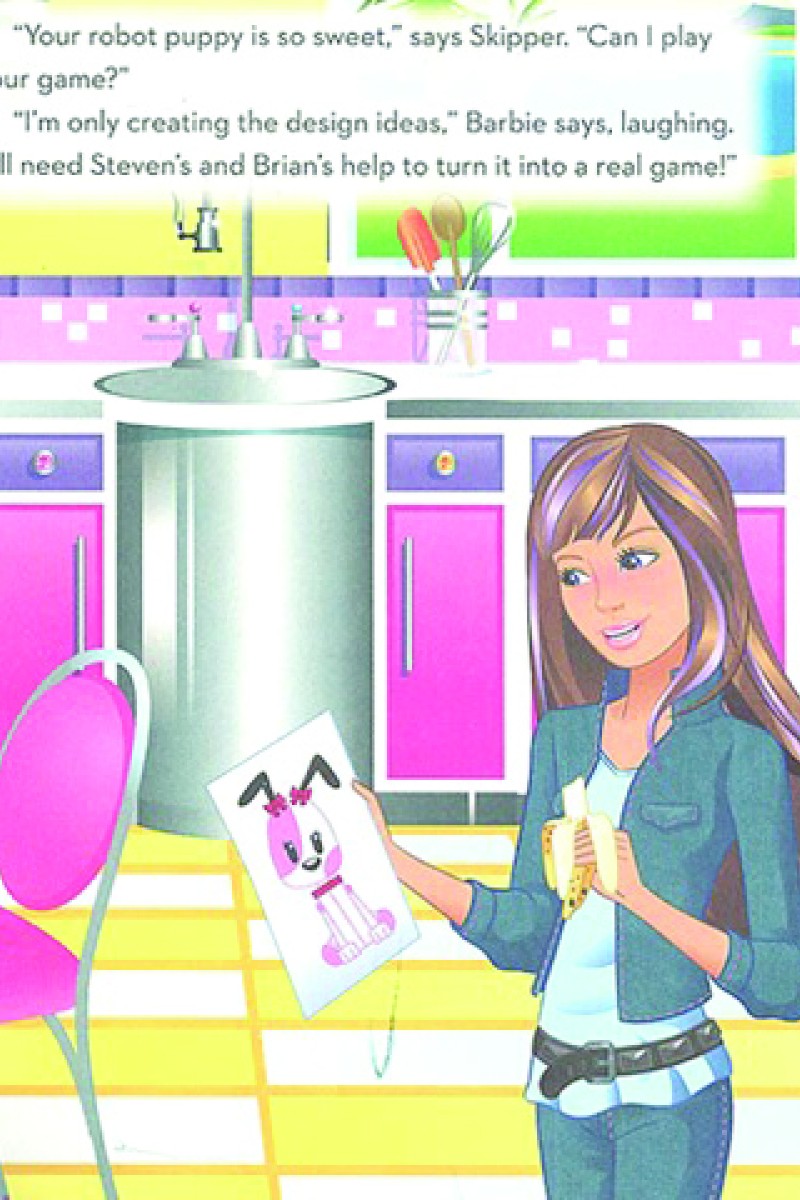
Written for beginner readers, the book tells the tale of a teen Barbie who is creating a computer game but crashes her laptop. She immediately gives up on the idea of solving the problem herself. Barbie also confesses to little sister Skipper that she can’t write software code. “I’ll need Steven’s and Brian’s help to turn it into a real game!” Barbie says.

Q: How many young women does it take to design and program a computer game?
A: None. Only boys know how to do that.
This, believe it or not, is the message to four- and five-year-old girls in the Barbie book, I Can be a Computer Engineer.
Written for beginner readers, the book tells the tale of a teen Barbie who is creating a computer game but crashes her laptop. She immediately gives up on the idea of solving the problem herself. Barbie also confesses to little sister Skipper that she can't write software code. “I’ll need Steven’s and Brian’s help to turn it into a real game!” Barbie says.
Except for its digital references, the storyline is trapped in 1959, the year Barbie was created. She's fashionable and even clever but ultimately a helpless female dependent on smarter, tech-savvy boys. As Steven tells Barbie: "It will go faster if Brian and I help."
The Barbie book, published in 2010 and available on Amazon.com, has taken a recent pummeling on the Internet as misogynistic (women hating) trash. Amazon last week showed 165 reviews - 148 gave the book one star. One critic created a website called Feminist Hacker Barbie that invited contributors to, er, revise the book's message by rewriting scenes.
Dudes can like pink
In a version written by Casey Fiesler, a doctoral student in human-centered computing at Georgia Tech, Brian's the lame coder, not Barbie. “Not everyone on a design team has to be writing code!” Barbie says. Also, Stephen has the most colourful laptop: “Nothing wrong with a dude liking pink,” he says.
An apology for the book was posted on Barbie’s Facebook page last week. Coincidentally, this was just after a British rocket scientist who helped land a spacecraft on a comet apologized for his TV interview from mission control: He had worn a shirt adorned with illustrations of women in their underwear.
Women are woefully under-represented in the computing and technology fields. Genevieve Thiers, the founder of Sittercity.com, is a real-life role model, one of a handful of women who are prominent tech entrepreneurs in Chicago. She's a strong proponent of addressing the factors that discourage women from going into tech fields.
Thiers says girls lost a crucial point of access to tech in the early 1980s when boys were first to embrace video gaming. That led marketers to conclude girls weren't interested. "It became a threshold," Thiers said. "The gamer geek thing was happening and she couldn't cross that gap."
Women MIA (missing in action) in tech
Today, Thiers said, women earn just 18 per cent of tech degrees and get 11 per cent of tech executive positions. Nearly all venture capitalists in the tech field are male. Messages can be exclusionary. Remember back in the early 1990s when Barbie’s owner, Mattel, caught trouble for a talking Barbie who sighed, "math class is tough."
Thiers has thought through potential solutions to the tech problem that include more education (teach girls and boys how to code in school) and more role models (create female TV characters who love tech, especially some who aren't experts). Mentoring would help. So would savvier thinking by investors. Think how many great start-up ideas by female entrepreneurs are waiting to be discovered, if only more women would get invited to pitch them.
Thiers declares that venture capital firms need many more women in their ranks and should regularly consult women so they don’t miss out on opportunities in industries traditionally run by women.
Overall in the workplace, barriers to female success continue to fall. Maybe even Brian can learn to write code - with Barbie’s help.
This editorial appeared in the Chicago Tribune on Saturday, November 29, 2014